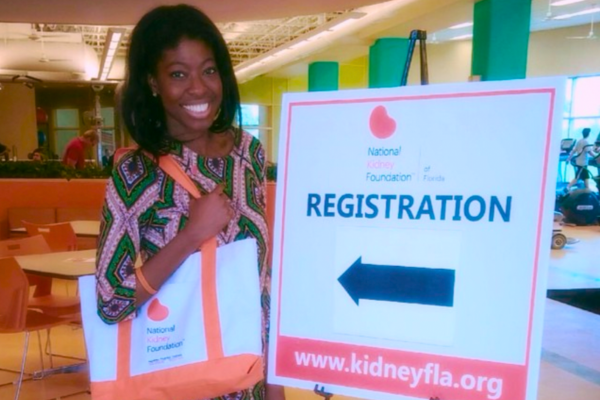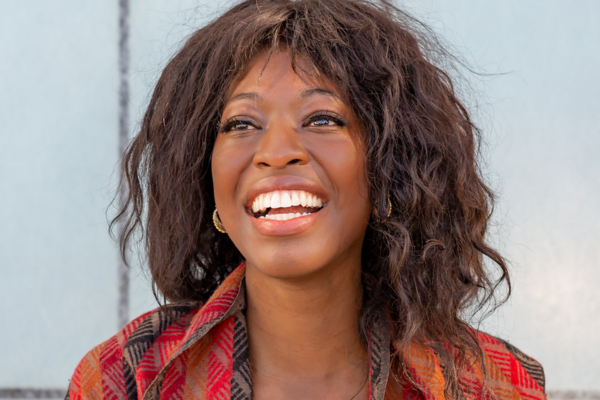August 19, 2024
In 2008 Ewodaghe (Ewo) Harrell was on summer break after completing her sophomore year in college. While she wanted to enjoy the time off, Ewo struggled with sudden fatigue and forgetfulness. She had no idea that these systems foreshadowed future lupus, lupus nephritis, and kidney failure diagnosis.
Crashing into Dialysis
When Ewo’s symptoms didn’t go away, she went to the doctor. Testing revealed she had lupus, an autoimmune disorder that causes the immune system to attack its own body.
“The diagnosis scared me because there is no cure and everyone experiences it differently,” said Ewo. “But I was determined to graduate and make the most out of my remaining college years. Even with flare ups that exhausted me, I went to class, participated in clubs, and hung out with my friends.”
Ewo’s determination paid off. She graduated in June 2010 and moved from Florida to France to learn French.
“I started swelling in early March 2011,” Ewo said. “I’d wake up my normal size. By the end of the day, I struggled to walk and breathe because of the fluid build-up.”
In April Ewo’s roommate came home from work and was shocked to see how her condition had worsened that day.
“I was full of fluid and exhausted. They took me to the doctor’s office. We were told to go to an emergency room immediately. We didn’t know it then but that doctor predicted I was well into kidney failure,” said Ewo. “By the time we reached the hospital, I could barely keep my eyes open and my head up.”
Ewo fell in and out of consciousness as doctors rushed to find out what was happening.
“I woke up the next day, looked in the mirror, and felt life slowly leave my body,” Ewo said. “I screamed for help and collapsed on the floor. I woke up on emergency dialysis after an induced coma. I had just accepted a fellowship and didn’t understand the permanence of dialysis. Later I’d come to understand how much my life had changed.”
Ewo was diagnosed with lupus and lupus nephritis, which occurs when the immune system attacks the kidneys. Testing also showed she had variants to her APOL1 gene. Studies have found that people with lupus nephritis and the APOL1 gene have more than two times the chance of developing kidney failure.1
Are you at risk for kidney disease? Take this one-minute quiz to find out.
Getting a Kidney Transplant

Ewo was released from the hospital in June of 2011.
“While doing in-center hemodialysis my doctors begged me to have a family member come to France to donate a kidney. Surgery would be free and they would also be able to test any family members for the same gene,” said Ewo. “My parents wanted me home to a medical system they understood.”
In August, Ewo decided to return to the U.S. and begin the transplant waitlist evaluation. Her brother flew in from Japan to become Ewo’s living kidney donor.
“I had to navigate the transplant waitlist myself. Neither my doctor’s office nor the dialysis center assisted. It took me a year to figure it out. During that time I participated in NKF's first kidney patient fly-in, now called the Kidney Patient Summit, in DC.” Ewo said. “I was inspired by the idea that groups and individuals could make change by talking to their legislators.”
Since the waitlist process was taking so long, Ewo encouraged her brother to return to his life in Japan. Just two months later, Ewo was approved for the UNOS Transplant Waiting List.
“My younger sister, Ayotunde, overheard a conversation about kidney donation between me and my parents,” said Ewo. “She shouted, ‘I can do it!’ As the older sister, I look out for her. It hadn’t occurred to me to ask. I was hesitant but she insisted.”
Ayotunde started the living donor evaluation in the winter of 2012. While waiting, Ewo returned her focus back to kidney advocacy, preparing to lead NKF’s Florida Delegation in the first-ever Kidney Patient Summit in March 2013.
By early 2013, Ayotunde was declared a match and cleared to donate. While Ewo was excited and grateful, she was overwhelmed by the enormity of the gift.
Ayotunde reassured Ewo. She said, “You need a kidney. We will go into surgery on July 31st. You’ll wake up with a part of me and better health. That is beautiful.”
The surgery was a success. Ayotunde recovered quickly, and Ewo felt better than ever.
Want to learn more about becoming a living kidney donor? Take NKF’s free online course ‘Becoming a Kidney Donor.’
Falling in Love
Inspired by her kidney journey and advocacy, Ewo started a public health graduate program.
“In 2016, I met Henry at my university. He was visiting for a workshop when we matched on a dating app. The morning after our dinner I told a close friend that he was the man I was going to marry,” Ewo said. “I graduated in 2017. I continued my career and relationship with Henry. We got engaged in 2018 and I relocated to live with him. We got married the following year.”
In 2020, Ewo and Henry began family planning. It was during this process that Ewo learned her kidney transplant wasn’t performing as well as it had been.
“In May 2021, a routine biopsy damaged my kidney transplant. My next blood test check showed a significant decrease in kidney function. There was no definitive answer to my situation–the kidney could last another one to three years,” Ewo said. “I wish they had a better prediction because we were starting a family through surrogacy. All I could do was hope we would have a healthy child at the right time.”
Ewo continued caring for the kidney the best she could. Part of this self-care included the couple’s lengthy sabbatical in Vienna. During this time, they matched with a surrogate who would help them create the family of their dreams.
After coming home, they returned to their everyday activities while waiting excitedly for the birth of their child. In January 2023, they welcomed a beautiful, healthy baby into the world.
Sadly, Ewo’s kidney failed just a few months later.
Are you looking for a living kidney donor but don’t know where to start? Take NKF’s free course to learn more.
Saving Two Lives at Once

Ewo started in-center hemodialysis while Henry began the living kidney donor evaluation.
“We knew the day would come, just not when. Ewo had gone through the transplant process once before, so she was able to prepare me a bit. Dialysis was hard for her the first time so her goal was to get a transplant before her kidney failed to avoid dialysis a second time,” Henry said. “In the end, she did have to go on dialysis again, which was difficult.”
Ewo and Henry’s family, friends, and neighbors rallied behind them, helping whenever possible.
“For me, donating was an easy decision. Ewo brings joy to everyone–strangers, friends, and family alike,” Henry said. “I’m blessed with good health and I like being independent, which wasn’t possible at the time. We relied on our community of supporters. They gave us so much that I had trouble asking anyone else to donate a kidney. I was determined to donate my own if I was a good candidate.”
Henry was declared a fit to donate in January 2024.
“Our blood types were compatible but our tissue types were not,” Henry said. “It took time to accept the idea of a paired exchange instead of a direct donation. Once it became clear that this was our doctor’s recommendation, we were on board.”
Ewo and Henry were matched with a recipient-donor pair the day they entered their information in the paired kidney exchange database. “It can take time to wait for the right group of donors and recipients to come together. We were lucky.”
“I only accepted Henry would donate his kidney when I heard he was a miracle match for the person who would receive his kidney,” said Ewo. “I knew then it was meant to be. Henry would save more than my life in the process.”
On February 7th, 2024, Ewo and Henry had their transplant surgeries.
“We had amazing caregivers, friends and family that supported us every step of the way,” Ewo said. “We both recovered quickly. Henry’s recovery was complete for him when he was able to bike to work again. For me, it’s still a process of getting back in shape after being so sick for so long.”
The couple are now looking forward to continuing to raise their child, traveling, and giving back to the people who stood by them every step of their journey.
“Ewo makes the world a better place everyday. The kidney she received from our paired exchange donor allows her to continue doing that,” Henry said. “I can’t thank the people who helped us in our journey enough; our amazing medical staff, aunt Ellen and brother Bawa who helped us during recovery, and our other family, friends, and neighbors who helped care for our son and supported us.”
While Henry knows Ewo will likely need another kidney donation in the decades to come, he remains optimistic because he knows organizations like NKF are of the working hard to build a better future for the kidney community.
“I have no more spare kidneys to give,” Henry said. “We will be reliant on the generosity of a new donor in the future. For that, we are very grateful to other kidney donors, people who get tested to donate, and organizations like NKF who educate communities about kidney disease and transplantation.”
Ewo and Henry had a group of friends and family to support them through these difficult times. Not everyone is so lucky. Make a financial contribution to NKF today so we can continue providing free support, education, and community to those who need it.
Source
1Pollak MR, Friedman DJ. APOL1 and APOL1-Associated Kidney Disease: A Common Disease, an Unusual Disease Gene - Proceedings of the Henry Shavelle Professorship. Glomerular Dis. 2023 Jan 25;3(1):75-87. doi: 10.1159/000529227. PMID: 37113494; PMCID: PMC10126737.
